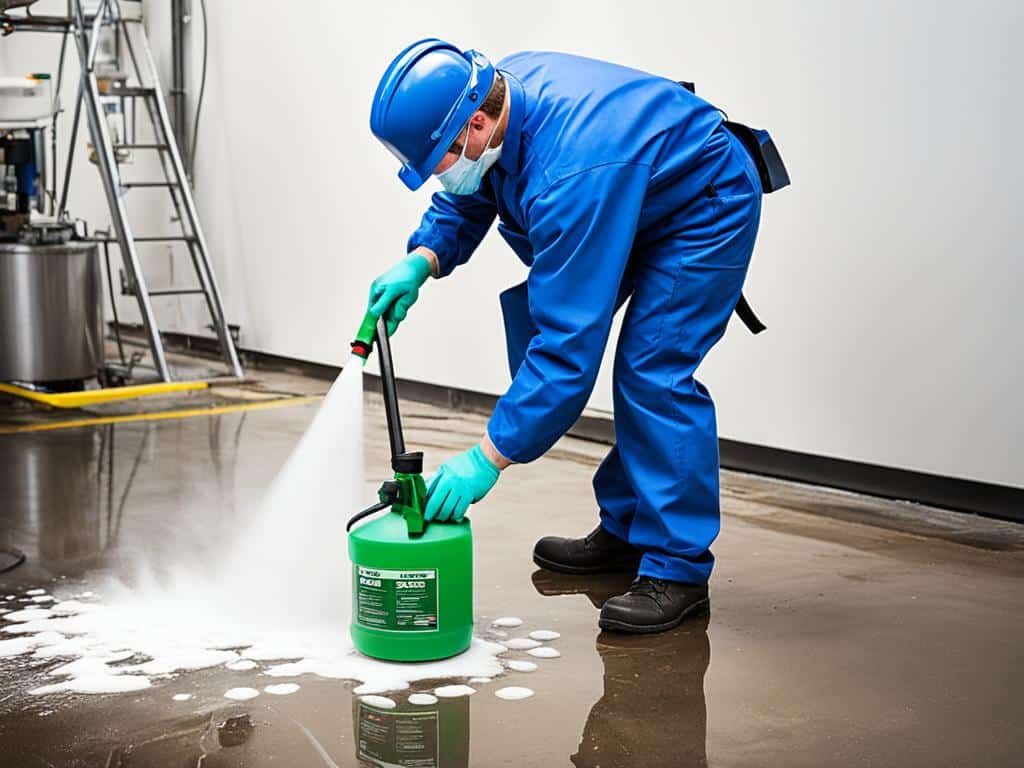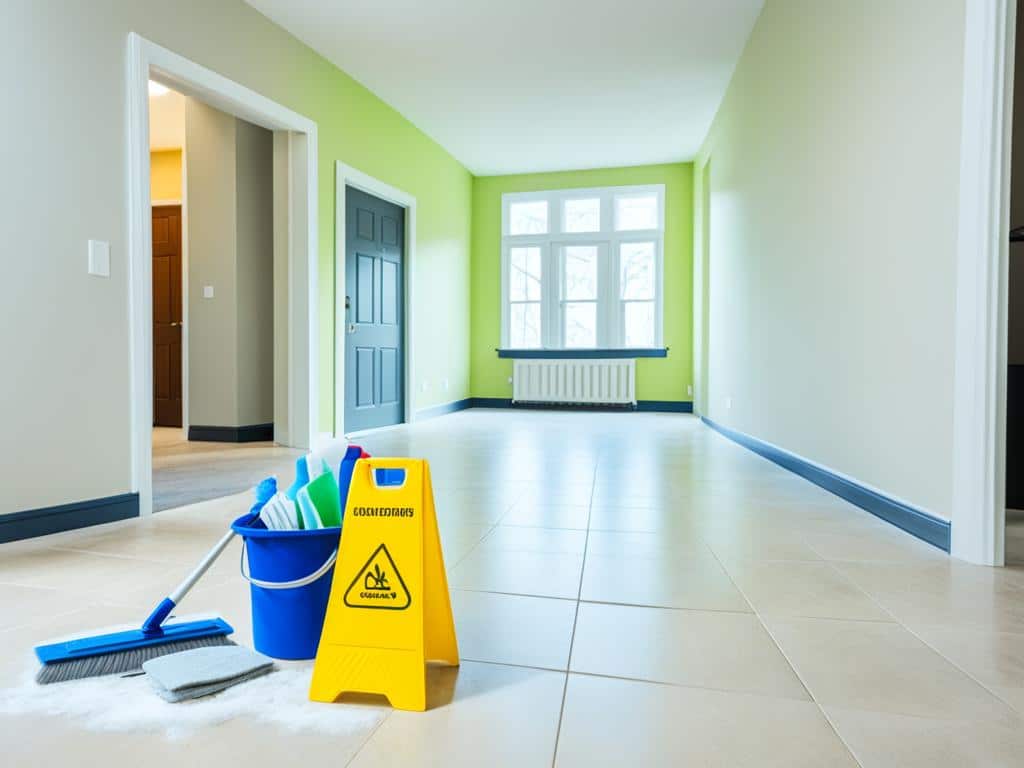
Have you ever wondered what makes industrial cleaning so effective? The secret lies in solvent based cleaners and their power to dissolve grease, oil, and tough stains. These chemical solvents are the go-to solution for various industries, known for their efficiency in breaking down stubborn, insoluble substances.
From paint thinner to heavy-duty degreasing agents, solvent based products can cut through the most persistent dirt, leaving surfaces spotless. But how exactly do these cleaners work, and why are they so preferred in industrial settings?
In the following sections, we’ll explore everything you need to know about solvent based cleaners. Get ready to uncover the science behind these potent cleaning agents and their diverse applications.
Understanding Solvent Based Cleaners
Solvent based cleaners are highly effective due to their unique *solvent properties*. Unlike their water-based counterparts, these cleaners excel in tasks requiring a deep clean without leaving any residue. The impurities dissolve thanks to the high *solubility* of the solvents, making them a go-to choice for rigorous cleaning challenges.
One of the main appealing features is their quick *evaporation rate*. After application, the solvent dries swiftly, eliminating any concerns about lingering moisture damage or corrosion. This rapid process contributes significantly to the *cleaning effectiveness* of solvent based cleaners, ensuring surfaces remain spotless and unblemished.
These cleaners are particularly advantageous for industrial and heavy-duty cleaning tasks. Their composition breaks down stubborn grease, oil, and other insoluble substances effortlessly. Thus, their role in maintaining cleanliness and hygiene cannot be overstated, especially in environments where high standards of cleanliness are imperative.
Types of Solvent Based Cleaners
When it comes to solvent based cleaners, they broadly fall into two categories: organic and inorganic. Each of these types has unique characteristics that cater to various industrial cleaning needs.
Organic Solvent Cleaners
Organic solvent cleaners primarily include hydrocarbon solvents such as toluene, xylene, and ethers. These are powerful in breaking down grease and grime, making them a go-to for heavy-duty industrial cleaning. Some of these solvents are now being produced as eco-friendly alternatives, giving you biodegradable solvents that don’t harm the environment. This balance of strength and sustainability is particularly appealing to eco-conscious users.
These organic solvents can effectively tackle various industrial cleaning tasks, from degreasing machinery to cleaning electronic components. Their versatility and efficient cleaning power make them indispensable in many sectors.
Inorganic Solvent Cleaners
Inorganic solvent cleaners are often mineral-based, designed for their robustness in heavy-duty industrial cleaning. These products include mineral spirits and chlorinated solvents, each offering distinct advantages and applications.
Mineral spirits are commonly used in paint thinning and equipment cleaning, thanks to their effective dissolving capabilities. On the other hand, chlorinated solvents are excellent for degreasing and metal cleaning, although they require careful handling due to their potential health risks.
| Solvent Type | Common Uses | Eco-Friendliness | Handling Precautions |
|---|---|---|---|
| Hydrocarbon Solvents | Grease removal, machinery cleaning | Moderate to High (depending on type) | Use in well-ventilated areas; wear protective gear |
| Mineral Spirits | Paint thinning, equipment cleaning | Low | Flammable; ensure proper storage |
| Chlorinated Solvents | Metal cleaning, degreasing | Low | Highly toxic; use protective equipment |
| Biodegradable Solvents | General cleaning | High | Usually safe, but follow manufacturer guidelines |
How Solvent Based Cleaners Work
Understanding the science behind solvent based cleaners helps you appreciate their effectiveness. The solvent action occurs at a molecular level. Solvents break down bonds in grease and oils, initiating the dissolving process.
This dissolving process involves chemical reactions that target unwanted substances. The solvents penetrate and disrupt the molecular structure of grime, making it easier to wipe away. The interaction of these chemical reactions is vital in maintaining the integrity of the material being cleaned.

Take a look at this table illustrating the different stages of the solvent action during cleaning:
| Stage | Action | Result |
|---|---|---|
| Penetration | Solvent molecules infiltrate the stain | Weakening of stain bonds |
| Dissolution | Solvents dissolve the bonds | Stain breaks apart |
| Removal | Stain molecules are lifted off the surface | Surface is clean and residue-free |
Benefits of Using Solvent Based Cleaners
The advantages of solvent based cleaners are multifaceted and impressive. These cleaners are renowned for their exceptional efficiency in tackling the toughest grime and grease. Whether it’s an industrial setting or a household, they streamline the cleaning process, offering remarkable time-saving solutions.
One significant benefit is their prowess in harsh stain removal. Stubborn marks, whether on machinery or upholstery, are no match for solvent based cleaners. Their chemical composition allows for deep penetration and effective stain lifting, minimizing the need for prolonged scrubbing.
Additionally, the efficiency of these cleaners translates into cost savings. Quick, effective cleaning reduces labor time and resource usage. Solvent based cleaners simplify tasks that would otherwise be time-consuming and labor-intensive, reinforcing their reputation as top-tier time-saving solutions.
Commercial and domestic users alike can benefit greatly from these powerful cleaning agents. Their versatility and power make them indispensable in various cleaning scenarios, ensuring surfaces remain spotless with minimal effort.
Components and Applications of Solvent Based Cleaners
Solvent based cleaners are power-packed with various active ingredients that make them effective. These ingredients play a significant role in removing tough stains and ensuring thorough cleaning.
Ingredients in Solvent Based Cleaners
One of the key components in these cleaners is active ingredients. These substances are responsible for breaking down grime and grease. Additionally, non-volatile compounds are often included to enhance the cleaning power without posing risks of evaporation. It’s essential to adhere to safety standards when using these products to avoid any hazards. Regulations ensure they are safe for both industrial applications and household cleaning.
Common Uses of Solvent Based Cleaners
The versatility of solvent based cleaners allows them to be used in various sectors. They are widely utilized in household cleaning for removing stubborn stains from different surfaces. In industrial applications, these cleaners are vital for heavy-duty tasks such as equipment maintenance and surface preparation. Automotive degreasing is another crucial application, where these cleaners effectively remove oil and grease from engines and other components.
| Use | Description |
|---|---|
| Household Cleaning | Effective in removing tough stains from surfaces. |
| Industrial Applications | Used for equipment maintenance and surface preparation. |
| Automotive Degreasing | Removes oil and grease from engines and other components. |
Conclusion
Understanding solvent based cleaners is crucial when it comes to making informed cleaning solution choices. Their effectiveness in tackling tough stains and grease can’t be overstated. Yet, it’s essential to balance this efficiency with the necessary health and environmental considerations.
Choosing the right cleaner involves more than just considering its power. You need to think about its impact on health and the environment. Some solvents, while effective, can pose health risks or environmental concerns if not used properly.
Ultimately, your goal should be to find a cleaning solution that’s both effective and responsible. Keep these points in mind, and you’ll be equipped to make the best decision for your needs, ensuring a cleaner, safer, and more sustainable environment.



